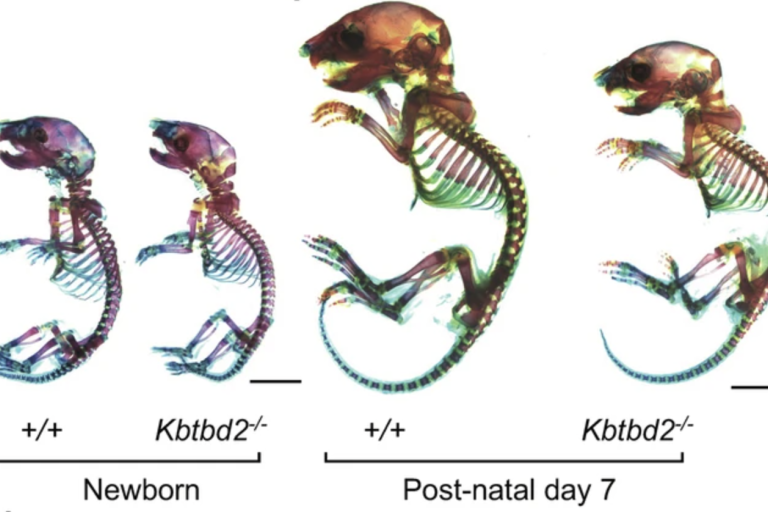
November 2024
Zhang Lab study uncovers a new role of KBTBD2 in regulating bone development
A paper from the Zhang Lab was published in Cell Death and Differentiation, revealing the role of KBTBD2 in bone development. While our previous work demonstrated that KBTBD2 functions in adipocytes to regulate insulin signaling, this study expands on those findings to uncover a new role for KBTBD2 in regulating osteoblast differentiation through IGF-1 signaling.
Read more about the KBTBD2 studyOctober 2024
Welcome Xinyue Zhang
Xinyue Zhang recently joined the Zhang Lab as an undergraduate student assistant. Xinyue is a 4th year undergraduate student from Xiamen University. She joined the Zhang Lab as a Beutler Institute exchange student. Welcome!
September 2024
Dr. Zhao Zhang awarded R21 grant
Dr. Zhang received an R21 grant to study the role of KBTBD2 in bone development from NICHD.
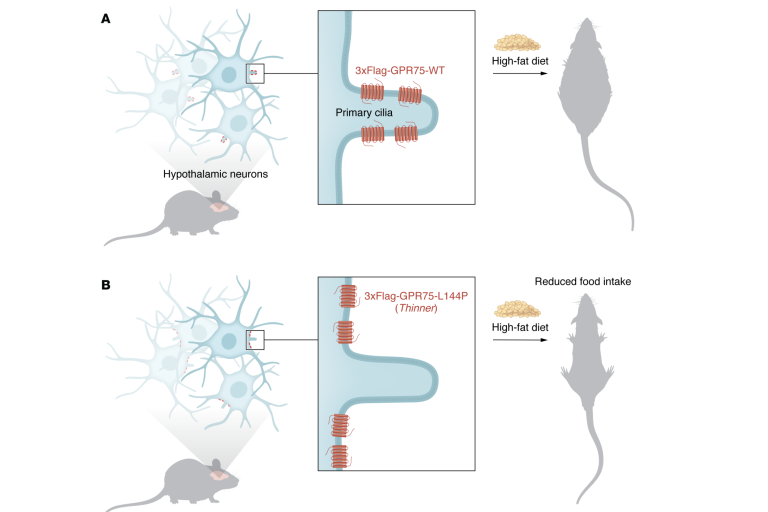
August 2024
Zhang Lab study reveals GPR75's role in primary cilia to regulate food Intake and obesity
A paper from the Zhang Lab was published in The Journal of Clinical Investigation identifying that GPR75, an orphan GPCR, functions in the primary cilia of neurons to regulate food intake and obesity. GPR75 is emerging as a promising target for obesity treatment, but its molecular mechanism (where and how it regulates energy homeostasis) remains unclear. This work revealed that GPR75 exclusively localizes in the primary cilia, a tiny organelle similar to an antenna, to regulate food intake in the brain.
A commentary paper was also published in the same issue, https://www.jci.org/articles/view/185059 (the model image is from this paper).
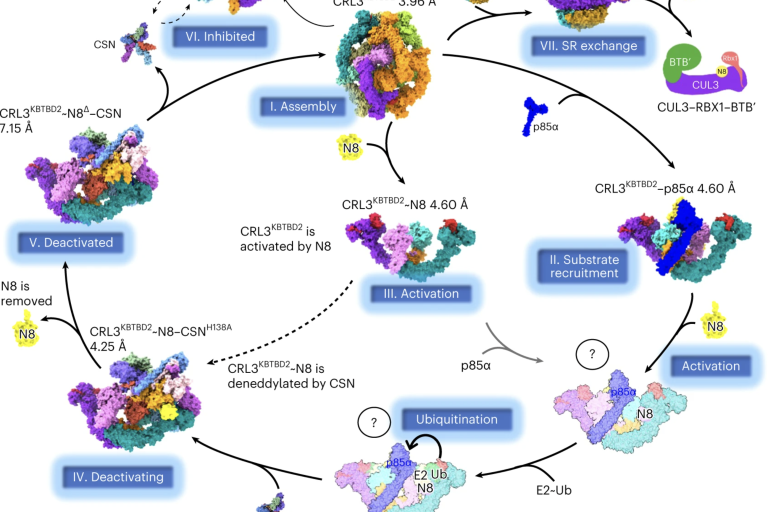
February 2024
Structural insights into how CUL3-KBTBD2 regulates p85α degradation
A collaborative paper from labs at UT Southwestern (Zhao Zhang, Bruce Beutler) and Fudan University (Zhenguo Chen, Lei Sun) was recently published in Nature Structural & Molecular Biology. The paper revealed the dynamic molecular architecture and substrate recruitment of the cullin3–RING E3 ligase CRL3-KBTBD2.
Read structural insights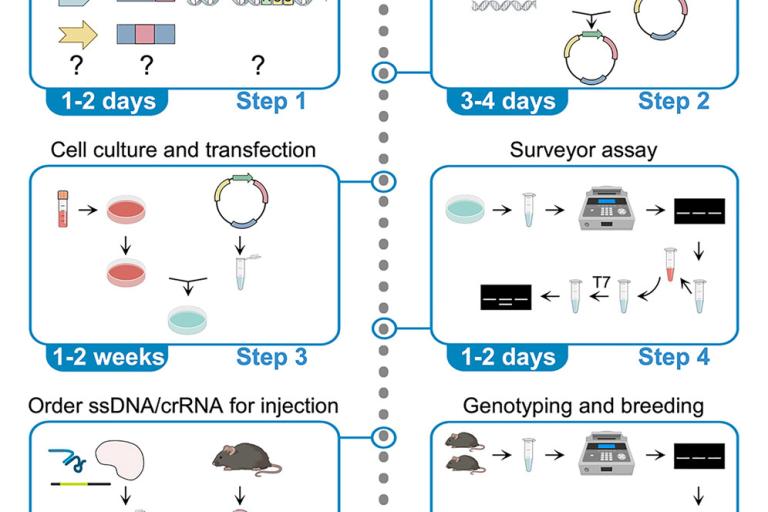
September 2023
A protocol paper from the Zhang Lab describing the generation of tag knock-in mice
A protocol paper from the Zhang Lab was recently published on STAR Protocols. This paper described the protocol for efficiently generating epitope tag knock-in mice using CRISPR-Cas9 to study the function of endogenous proteins.
Read more of the protocol paperJuly 2023
Dr. Zhao Zhang won 2023 Haberecht Wildhare-Idea Research Grant
The Haberecht Wildhare-Idea Research Grant supports "a hare-brained idea that, if correct, would be the basis for a giant step in biomedical research". Dr. Zhang's proposal is to comparing cold tolerance in Neanderthals and modern humans to enhance our understanding of fat metabolism.
See the news release in Center Times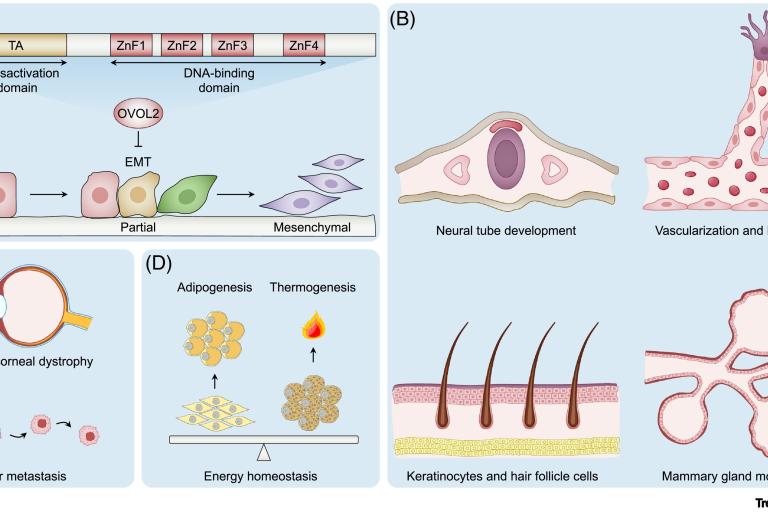
June 2023
A review paper came out of the Zhang Lab to summarize the role of OVOL2
A reviewer paper from the Zhang Lab was recently published on Trends in Cell Biology. In this review, both the classic role of OVOL2 in embryogenesis and tumorigenesis, and the emerging role of OVOL2 in energy homeostasis have been discussed.
Read about the role of OVOL2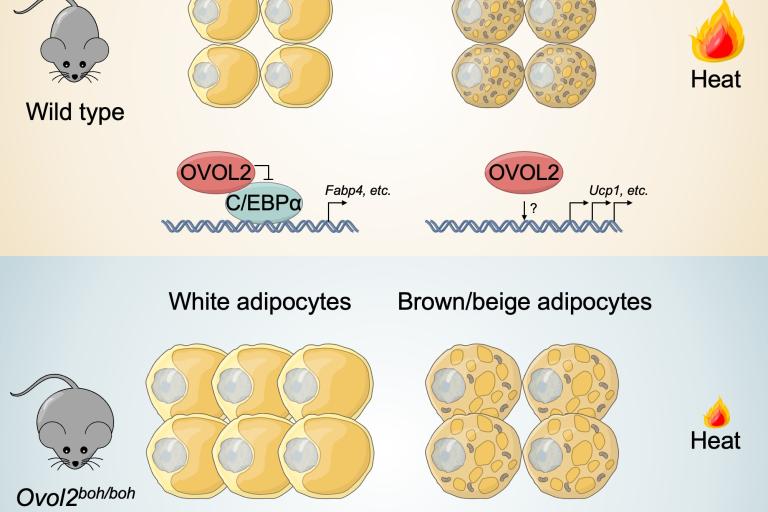
October 2022
Defect in gene caused massive obesity in mice despite normal food intake
The third paper came out of the Zhang Lab published on Cell Metabolism to identify a form of obesity caused not by hyperphagia or hypokinesis but by decreased thermal energy expenditure due to a viable hypomorphic allele of the essential gene Ovol2. Ovol2 may eventually become target for anti-obesity drugs.
This research has been reported by D Magazine:
https://www.dmagazine.com/healthcare-business/2022/11/study-obesity-caused-by-faulty-gene-not-diet/
October 2022
Welcome Jiayi Zhang
Jiayi Zhang recently joined the Zhang Lab as an undergraduate student assistant. Jiayi is a 4th year undergraduate student from Sichuan University. She joined the Zhang Lab as a Beutler Institute exchange student. Welcome!
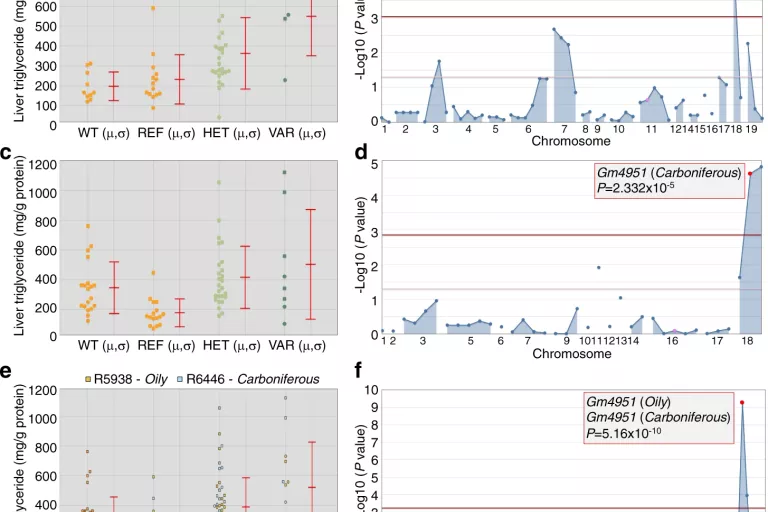
September 2022
UT Southwestern geneticists identify new mechanism for nonalcoholic fatty liver disease absent obesity
The second paper came out of the Zhang Lab published on Nature Communications to identify two mutants of a poorly studied GTPase Gm4951 that contribute to nonalcoholic fatty liver disease (NAFLD). Different from the general thinking that NAFLD is strongly associated with obesity, these two mutants develop servere fatty liver without further increase in body weight. Identifying the role of this gene in development of NAFLD provides important new direction to find potential treatments.
Read more about the new mechanismApril 2022
Dr. Zhang invited to speak at the 2022 Gordon Research Conference
Dr. Zhang presented a talk titled “Forward Genetics of Fatty Liver Disease” during the Keynote Session of 2022 GRC “Alcohol-Induced End Organ Diseases” on April 24, 2022 in Ventura, CA.
More information about the meetingApril 2022
Welcome Dr. Yiao Jiang
Dr. Yiao Jiang officially joined the Zhang Lab as a postdoctoral researcher. Yiao received his Ph.D. degree from the Center for Excellence in Molecular Cell Science, Chinese Academy of Sciences in 2022. He joined the Zhang Lab right after graduation. Welcome!
January 2022
Dr. Zhao Zhang awarded R01 Grant
Dr. Zhang received an R01 grant to study the role of GM4951 in nonalcoholic fatty liver disease from NIDDK.
November 2021
Zhang Lab moves to new space at Simmons Biomedical Research Building (NB)
We recently moved into a newly renovated lab space at NB9. Let’s keep the new lab clean and organized.
February 2021
Zhang Lab welcomes Dr. Yu Xun
Dr. Yu Xun officially joined the Zhang Lab as the first postdoc. Yu earned his Ph.D. from Hunan Normal University in 2018. He did a short postdoc at Louisiana State University before he joined the Zhang Lab at UT Southwestern.
Welcome!
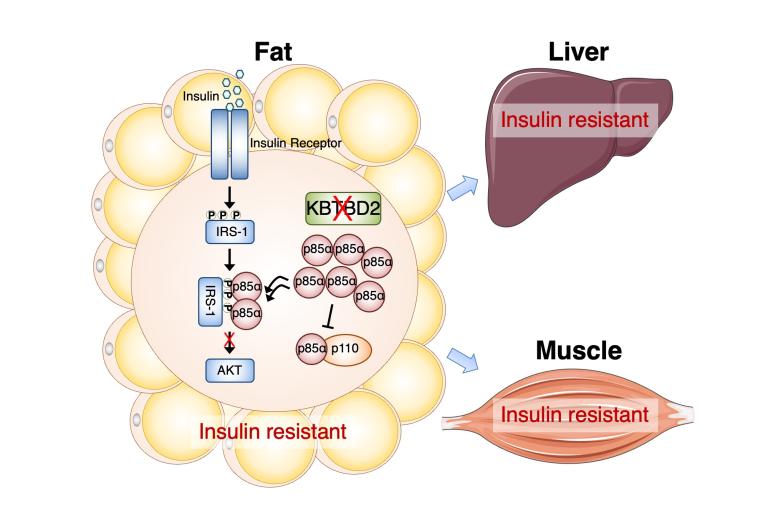
July 2020
Gene in fat plays key role in insulin resistance
The first paper came out of the Zhang Lab published on PNAS to follow up our discovery of KBTBD2. Developing a better understanding of KBTBD2 could have implications for Type 2 diabetes.
Read more about this key roleJune 2020
Zhang Lab is officially open today!
The Zhang Lab is officially open on June 1, 2020, with a primary affiliation to the Center for the Genetics of Host Defense, and a secondary affiliation to the Division of Endocrinology, Department of Internal Medicine. We are looking for postdocs, graduate students, and technical staff to join our growing lab.
Join us